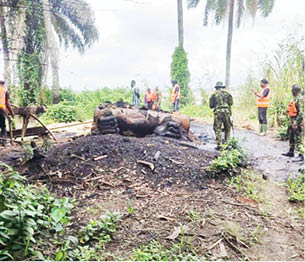The trend of sabotaging the national economy through illegal refining of crude oil, otherwise known as oil bunkering, appears unending in the Niger Delta region as syndicates operating the illegal business devise new means of survival daily, despite the efforts of the Nigerian government to tackle the problem.
Weekend Trust gathered that the syndicates are made up of people from all sectors of the economy, including the locals, traditional rulers, clergy, security operatives, and staff of oil companies, among others.
The business of crude theft and illegal oil refining is also fast becoming a booming venture in the region, with many of the youths aspiring to go into the business of supplying illegally refined petroleum products, popularly known as ‘Spotfire’ in parts of the country.
Despite efforts by successive Nigerian governments to curb the ‘illegal business’, the cartels operating it are undaunted, taking advantage of the terrain and conspiring with compromised security agents in the region to continue with their sabotage.
- As insecurity, climate crisis push 31.8m Nigerians into hunger
- Nigeria’s out-of-school children: A ticking time bomb
Weekend Trust learnt that each day, oil companies in Nigeria lose between 300,000 and 400,000 barrels of oil to theft, which also account for almost 15 per cent of the country’s 2.4 million barrels per day production capacity.
Bunkering involves oil theft, including the diversion and smuggling of oil and the unauthorised loading of ships. It involves tapping into oil pipelines and transporting the stolen oil elsewhere to be sold internationally or refined locally. To access the oil, a small group of welders will puncture a pipeline and establish a tapping point from which the group operates.
Though most of the refining sites are located in the creeks and forests in the riverine areas, these activities occur throughout the areas where pipelines are located – in Rivers, Bayelsa, Delta, Imo, Akwa Ibom and Abia states – thereby causing environmental pollution in the Niger Delta region.
Oil export revenue accounts for 70 per cent of Nigeria’s total government revenue and 95 per cent of the country’s export income. A loss of 300,000 barrels a day costs the government roughly $1.7 billion a month.
Residents of some communities in Bayelsa State, where these oil bunkering activities are being carried out, told Weekend Trust that it would be difficult to stop oil theft and illegal refining in the Niger Delta, as some of those who are supposed to enforce government laws are complicit.
An illegal bunkerer shares his story
An illegal oil bunkering site operator in Biseni community in Yenagoa Local Government Area of Bayelsa State told our correspondent, on condition of anonymity, that illegal oil bunkering has supply chains and is aided by influential people in society.
Also, Michael Lawrence (not real name), a graduate of Microbiology, said difficult economic realities frustrated him, which was why he abandoned his certificate and found a job as a motorcyclist (Okada rider). He plies his new trade in Oyigbo, Eleme and Odagwa Etche areas of Rivers State. The Okada business, he said, connected him to a friend who introduced him to oil bunkering.

